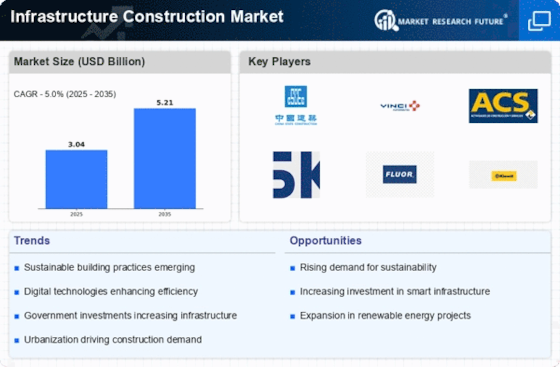Top Industry Leaders in the Infrastructure Construction Market

The global infrastructure construction market is a behemoth, estimated to reach a staggering USD 4.34 Billion by 2032. This sprawling landscape is characterized by a dynamic and ever-evolving competitive landscape, where established players jostle for market share with nimble newcomers armed with innovative technologies.
Strategies for Success:
Leading players in the infrastructure construction market adopt a multi-pronged approach to secure their positions:
-
Geographic Expansion: Expanding into emerging economies with high infrastructure needs like India and Southeast Asia is a key strategy. Players like China State Construction and Vinci are actively pursuing projects in these regions. -
Specialization: Focusing on niche segments like renewable energy infrastructure or smart city development offers competitive differentiation. Companies like Siemens and ABB are capitalizing on this trend. -
Technological Adoption: Embracing technologies like Building Information Modeling (BIM), modular construction, and drones for enhanced efficiency and productivity is becoming a necessity. Bouygues and Skanska are leading the way in this area. -
Consolidation and Mergers & Acquisitions: Mergers and acquisitions offer opportunities for expanding capabilities and geographic reach. The recent acquisition of Laing O'Rourke by Cimic Group exemplifies this trend. -
Sustainability Focus: Integrating sustainable practices and materials into projects is gaining traction, driven by environmental concerns and investor demands. Companies like Balfour Beatty and Salini Impregilo are actively promoting sustainability initiatives.
Factors Shaping Market Share:
Several key factors influence market share in the infrastructure construction market:
-
Financial Strength: The ability to secure financing for large-scale projects is crucial. Companies with strong balance sheets and access to capital markets have a significant advantage. -
Experience and Expertise: A proven track record of successfully completing complex projects and a deep understanding of local regulations and market conditions are essential. -
Innovation: The ability to adopt and implement new technologies that improve efficiency, safety, and sustainability is becoming increasingly important. -
Partnerships and Collaborations: Building strong partnerships with governments, investors, and other stakeholders can enhance project success and open doors to new opportunities. -
Corporate Social Responsibility: Demonstrating a commitment to social responsibility and community engagement can attract clients and investors.
Key companies in the Infrastructure Construction Market include
-
China State Construction Engineering Corp. Ltd
-
VINCI
-
China Communications Construction Group Ltd
-
Balfour Beatty
-
Skanska AB
-
Kajima Corporation
-
Fluor Corporation
-
Kiewit Corporation
-
Laing O’Rourke
-
ACS Group
-
Hyundai Engineering & Construction Co. Ltd (HDEC)
-
Bouygues Group
-
Larsen & Toubro
-
Royal BAM Group
-
Hochtief Aktiengesellschaft
Recent Development
October 2022: China Communications Construction Company Limited (CCCC), together with PipeChina (officially known as China Oil & Gas Pipeline Network Corporation), held a signing ceremony for a strategic framework agreement on cooperation between two parties in Beijing.
January 2022: VINCI was awarded the contract for the Takitimu North Link Road project located in southeast Auckland, New Zealand.
Takitimu North Link will be designed and built by HEB Construction - a subsidiary of VINCI Construction in New Zealand - through a joint venture with Fulton Hogan, which is responsible for design & construction works. This scheme will improve accessibility, supporting urban development within the region while also relieving neighboring towns from heavy freight traffic thus enhancing safety.
March 2023: In March 2023, HOCHTIEF and infrastructure financier Palladio Partners came together to construct and run a sustainable data center in Heiligenhaus, North Rhine-Westphalia. The parties agreed on the new cutting-edge YEXIO facility at the university town's Innovation Park.
For example, in February 2023, the National Health Service (NHS) launched a £450 million transport infrastructure framework that sets out ambitious plans for sustainable transport and national infrastructure, offering a comprehensive approach to this matter.










